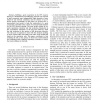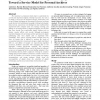87 search results - page 1 / 18 » Evaluating Lost Person Behavior Models |
CMOT
2010
13 years 2 months ago
2010
: In Wilderness Search and Rescue (WiSAR), the incident commander (IC) creates a probability distribution map of the likely location of the missing person. This map is important be...
HICSS
2005
IEEE
13 years 11 months ago
2005
IEEE
— Building a good cooperation in the P2P resource sharing is a fundamental and challenging research topic because of peer anonymity, peer independence, high dynamics of peer beha...
CORR
2007
Springer
13 years 5 months ago
2007
Springer
We conducted a preliminary field study to understand the current state of personal digital archiving in practice. Our aim is to design a service for the long-term storage, preserv...
ICCSA
2005
Springer
13 years 10 months ago
2005
Springer
In order to complement the incomplete training audit trails, model generalization is always utilized to infer more unknown knowledge for intrusion detection. Thus, it is important ...
CIKM
2009
Springer
13 years 12 months ago
2009
Springer
Trust plays important roles in diverse decentralized environments, including our society at large. Computational trust models help to, for instance, guide users’ judgements in o...


